Trending
Opinion: How will Project 2025 impact game developers?
The Heritage Foundation's manifesto for the possible next administration could do great harm to many, including large portions of the game development community.

Featured Blog | This community-written post highlights the best of what the game industry has to offer. Read more like it on the Game Developer Blogs or learn how to Submit Your Own Blog Post
This article expands on content from the GDC talk, "From Total War to Assassin's Creed: Music for Mobile Games." The talk explored the role of music in portable games. Included: additional discussion & full length streaming tracks for illustration.

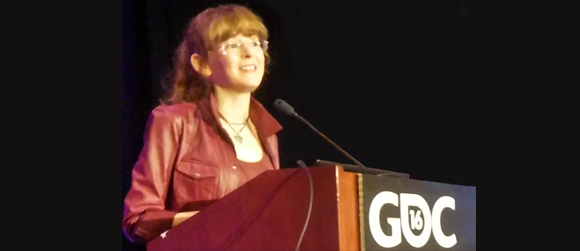
Last week, it was my honor and pleasure to give a presentation at the Game Developers Conference in San Francisco. My talk was entitled "From Total War to Assassin's Creed: Music for Mobile Games." The talk focused on the best and most effective methods for composition and implementation of music in portable gaming. The talk was structured for the benefit of video game composers and game audio pros, and as a part of the presentation, I played short excerpts of music that I composed for several of my top mobile and handheld video game projects. Now that GDC is over, I thought I'd provide streaming links to some of the complete music tracks that I featured during my presentation, in case attendees were curious about the complete pieces of music. So, without further ado, here are tracks from my GDC 2016 talk!
The Assassin's Creed Liberation game was released by Ubisoft for the PlayStation Vita, and delivered an immersive experience from the popular Assassin's Creed franchise. The game was designed specifically for a portable system, and as such, all aspects of the design were adjusted to cater specifically to a portable gaming experience, including the music.
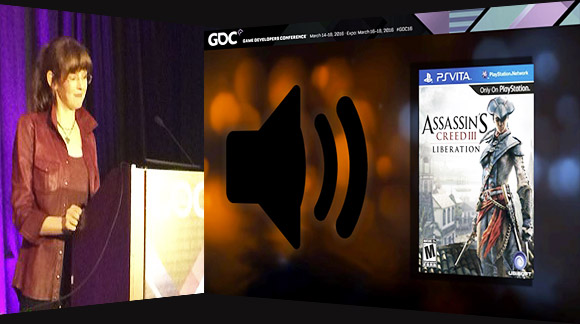
During my talk, I discussed the challenges of adapting a full-fledged Assassin's Creed musical score to a handheld platform, using one of the menu tracks from the game as an example. Here is that track, entitled "Animus."
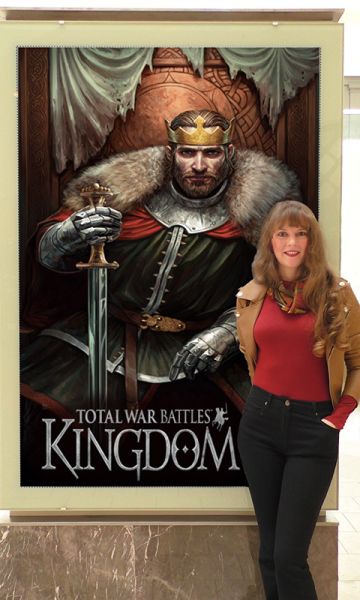 For the Total War Battles: Kingdom game from Creative Assembly/SEGA, I was honored to join a team of skilled composers, and together we worked hard to create a triple-A quality score for this portable game from the awesome Total War franchise. Each of the composers created their own unique musical tracks for this project, and as a part of the team, I composed many tracks that worked to create an involving medieval atmosphere.
For the Total War Battles: Kingdom game from Creative Assembly/SEGA, I was honored to join a team of skilled composers, and together we worked hard to create a triple-A quality score for this portable game from the awesome Total War franchise. Each of the composers created their own unique musical tracks for this project, and as a part of the team, I composed many tracks that worked to create an involving medieval atmosphere.
The recordings included many talented session musicians performing with authentic medieval instruments and techniques. Total War Battles: Kingdom is an example of how audio production value in a portable game can show the same level of polish and ambition as music for console and PC gaming. Below you can see some of the accomplished musicians who performed in the Total War Battles: Kingdom soundtrack: from left to right: Elizabeth Kenny (Lute), Richard Harwood (Cello), Sylvia Hallett (Hurdy Gurdy), and Heather Wrighton (Harp).

During my GDC speech last week, I played an excerpt of my music from that project. Here is the complete track, entitled "Dark Ages."
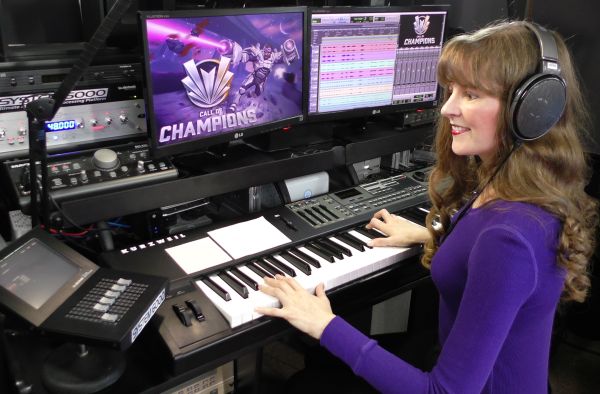 Call of Champions is a Multiplayer Online Battle Arena game developed by the team at Spacetime Studios. The game is designed for tablets and smartphones, and is the first MOBA specifically designed to accommodate the short gaming sessions that are typical for mobile games. With matches limited to 5 minutes, the Call of Champions battle experience is designed to engage gamers-on-the-go, and all aspects of the game design are optimized to enhance engagement for these quick matches. With this in mind, I composed the music for Call of Champions to energize players in order to best enhance gameplay momentum and engagement. To illustrate these principles, I played two excerpts from the musical score for Call of Champions. Here are those complete tracks:
Call of Champions is a Multiplayer Online Battle Arena game developed by the team at Spacetime Studios. The game is designed for tablets and smartphones, and is the first MOBA specifically designed to accommodate the short gaming sessions that are typical for mobile games. With matches limited to 5 minutes, the Call of Champions battle experience is designed to engage gamers-on-the-go, and all aspects of the game design are optimized to enhance engagement for these quick matches. With this in mind, I composed the music for Call of Champions to energize players in order to best enhance gameplay momentum and engagement. To illustrate these principles, I played two excerpts from the musical score for Call of Champions. Here are those complete tracks:
Call of Champions (Champions Theme)
Call of Champions (Battle Arena)
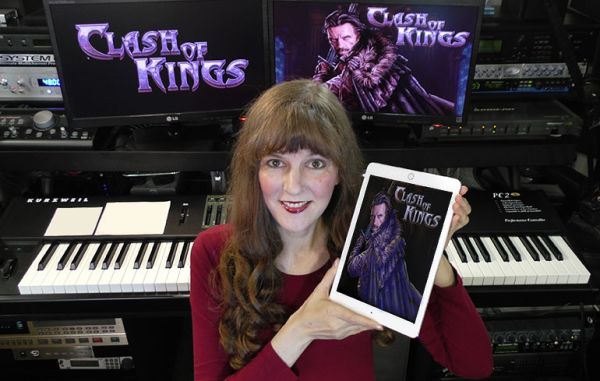 In the Clash of Kings mobile game from ELEX, players build empires and form alliances in the attempt to achieve world domination in a medieval fantasy setting. During my talk, I discussed my work as the composer for Clash of Kings, pointing out that my music for this project incorporated production values that included live choral recordings. By increasing our ambition and investment in the audio side of these projects, we can stimulate the engagement of players and their enjoyment of the experience as a whole. To demonstrate, I played an excerpt of choral music from Clash of Kings, so here is that track in its entirety:
In the Clash of Kings mobile game from ELEX, players build empires and form alliances in the attempt to achieve world domination in a medieval fantasy setting. During my talk, I discussed my work as the composer for Clash of Kings, pointing out that my music for this project incorporated production values that included live choral recordings. By increasing our ambition and investment in the audio side of these projects, we can stimulate the engagement of players and their enjoyment of the experience as a whole. To demonstrate, I played an excerpt of choral music from Clash of Kings, so here is that track in its entirety:
Clash of Kings: Sovereign Kingdom
The Speed Racer portable game was developed by Virtuos and published by Warner Bros Interactive Entertainment. Based on the famous Speed Racer IP, this handheld game was a good illustration of how music implementation can differ drastically from a console to a handheld platform. While the console version of the Speed Racer video game included lengthy pieces of music, the version that Virtuos developed for the Nintendo DS used music excerpts that could be loaded into memory quickly.
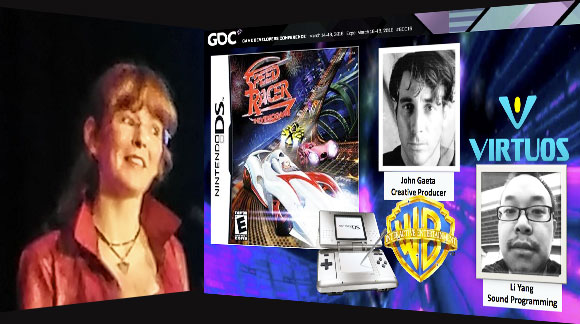
To illustrate this, I played excerpts from two pieces of music that I composed for Speed Racer, as they were heard in the Nintendo DS game. To show how these versions differed from their console counterparts, here now are the full-length console versions of these two tracks:
Rev It Up (Speed Racer: The Official Video Game)
Fuji Helexicon (Speed Racer: The Official Video Game)
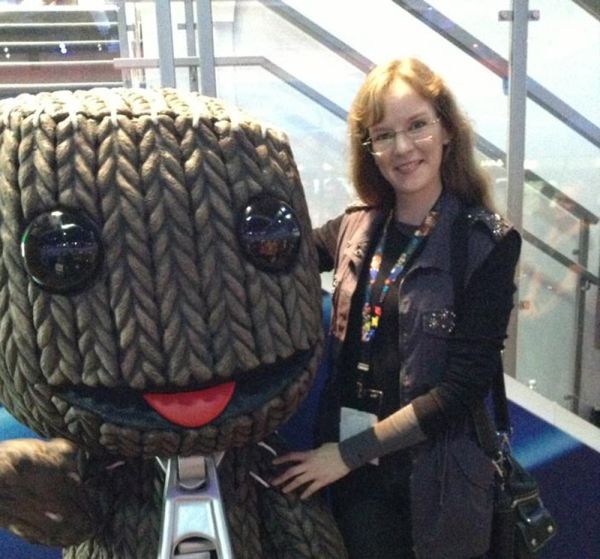 Much of my GDC talk this year focused on implementation systems designed to accommodate the capabilities of portable gaming platforms. As such, the discussion often focused on resourceful methods to maximize musical impact while economizing on system resources. However, with Sony Computer Entertainment Europe's LittleBigPlanet game for the PS Vita, the structure of the music system remained memory-intensive, partly due to the underlying design philosophy of the LittleBigPlanet franchise itself. Players have always been able to design their own levels in LittleBigPlanet, and this has always included the ability to implement interactive music. Since this capability was a required element in the PS Vita game, the audio team at Tarsier Studios found ways to streamline the music system while retaining its interactive capabilities. To demonstrate this, I played an excerpt of one of my tracks from LittleBigPlanet PS Vita. Here is the entire track, entitled "The Land of Marianne."
Much of my GDC talk this year focused on implementation systems designed to accommodate the capabilities of portable gaming platforms. As such, the discussion often focused on resourceful methods to maximize musical impact while economizing on system resources. However, with Sony Computer Entertainment Europe's LittleBigPlanet game for the PS Vita, the structure of the music system remained memory-intensive, partly due to the underlying design philosophy of the LittleBigPlanet franchise itself. Players have always been able to design their own levels in LittleBigPlanet, and this has always included the ability to implement interactive music. Since this capability was a required element in the PS Vita game, the audio team at Tarsier Studios found ways to streamline the music system while retaining its interactive capabilities. To demonstrate this, I played an excerpt of one of my tracks from LittleBigPlanet PS Vita. Here is the entire track, entitled "The Land of Marianne."
I hope you've enjoyed these streaming music links that expand on the samples I presented during my GDC talk last week. Speaking at GDC was a wonderful experience, and it was an honor to meet so many great game audio folks during the conference! I hope everyone had a rewarding GDC this year, and I hope I'll see many of you again at GDC 2017!
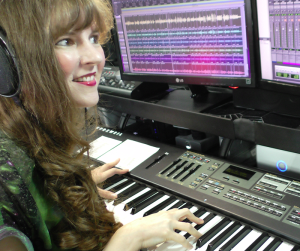 Winifred Phillips is an award-winning video game music composer whose most recent project is the triple-A first person shooter Homefront: The Revolution. Her credits include five of the most famous and popular franchises in video gaming: Assassin’s Creed, LittleBigPlanet, Total War, God of War, and The Sims. She is the author of the award-winning bestseller A COMPOSER'S GUIDE TO GAME MUSIC, published by the Massachusetts Institute of Technology Press. As a VR game music expert, she writes frequently on the future of music in virtual reality video games.
Winifred Phillips is an award-winning video game music composer whose most recent project is the triple-A first person shooter Homefront: The Revolution. Her credits include five of the most famous and popular franchises in video gaming: Assassin’s Creed, LittleBigPlanet, Total War, God of War, and The Sims. She is the author of the award-winning bestseller A COMPOSER'S GUIDE TO GAME MUSIC, published by the Massachusetts Institute of Technology Press. As a VR game music expert, she writes frequently on the future of music in virtual reality video games.
Follow her on Twitter @winphillips.
Read more about:
Featured BlogsYou May Also Like